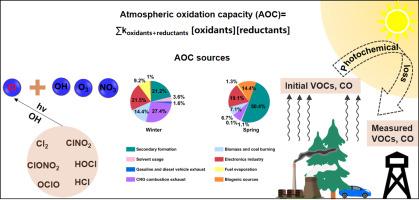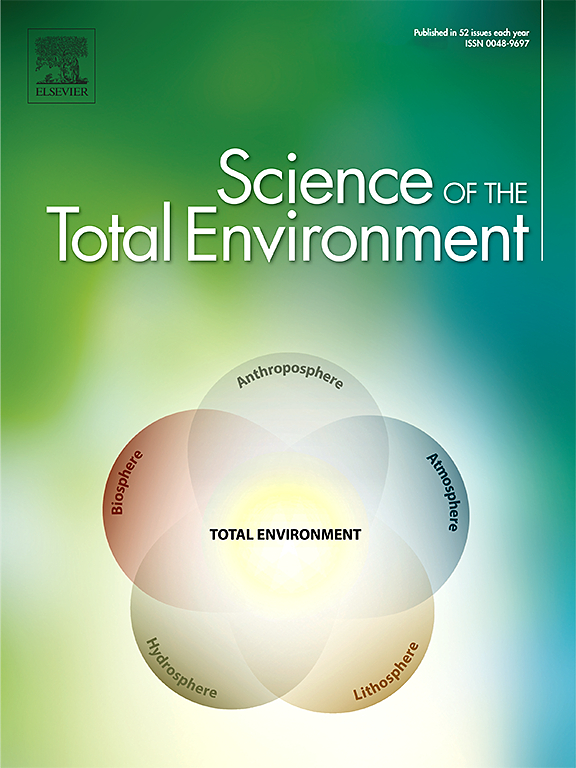Quantification and source apportionment of atmospheric oxidation capacity in urban atmosphere by considering reactive chlorine species and photochemical loss of VOCs
IF 8
1区 环境科学与生态学
Q1 ENVIRONMENTAL SCIENCES
引用次数: 0
Abstract
Atmospheric oxidation capacity (AOC) reflects the potential of the atmosphere in converting primary pollutants into secondary aerosols and ozone (O3). In this study, the AOC at an urban supersite in Wuhan, a megacity in central China, was quantified by considering the reactions of volatile organic compounds (VOCs) and carbon monoxide (CO) with atmospheric oxidants (OH, NO3, O3, and Cl). Photochemical loss of total VOCs (13.7–23.7 %) during transport was accounted for by monitoring the concentration ratio of o-xylene and ethylbenzene, a VOC pair with diverse reaction rate constants with OH. AOC would be underestimated by 9.0–25.2 % in the 4 seasons if being estimated from the observed VOCs instead of photochemical-loss corrected VOCs. The atmospheric oxidants were measured or indirectly estimated using well-established parameterizations. In particular, hourly reactive chlorine species were measured using an iodide-based chemical ionization mass spectrometer (I-CIMS). Cl radical concentration was calculated by assuming a steady-state between the production from reactive chlorine species and the removal by O3 and VOCs. The result showed that AOC would be underestimated by 14.5 % and 1.9 % in winter and spring if Cl radicals were neglected. Based on the above quantification, the composition of AOC was further apportioned to atmospheric oxidants, VOC categories, as well as the sources of VOC and CO. In winter, CNG combustion exhaust, electronics industry, and secondary formation were critical for regulating the AOC. In spring, secondary formation was the most important AOC source, followed by electronics industry and biogenic sources.

考虑活性氯种类和挥发性有机化合物光化学损失的城市大气氧化能力量化及来源分配
大气氧化能力(AOC)反映了大气将一次污染物转化为二次气溶胶和臭氧(O3)的潜力。本研究通过考虑挥发性有机化合物(VOCs)和一氧化碳(CO)与大气氧化剂(OH、NO3、O3和Cl)的反应,对中国中部特大城市武汉某城市超级站点的AOC进行了量化。运输过程中总挥发性有机化合物(VOCs)的光化学损失(13.7- 23.7%)是通过监测与OH反应速率常数不同的VOC对邻二甲苯和乙苯的浓度比来解释的。如果不采用经光化学损失校正的VOCs,而采用观测的VOCs来估算,4个季节的AOC将被低估9.0% ~ 25.2%。大气氧化剂测量或间接估计使用完善的参数化。特别地,每小时活性氯的种类被测量使用基于碘的化学电离质谱仪(I-CIMS)。氯自由基的浓度是通过假设活性氯的生成与O3和VOCs的去除之间的稳态来计算的。结果表明,如果忽略Cl自由基,冬季和春季的AOC分别被低估14.5%和1.9%。在此基础上,将大气中AOC的组成进一步划分为大气氧化剂、VOC类别以及VOC和CO的来源。冬季,CNG燃烧废气、电子工业和二次生成对AOC的调节至关重要。在春季,次生地层是主要的AOC来源,其次是电子工业来源和生物来源。
本文章由计算机程序翻译,如有差异,请以英文原文为准。
求助全文
约1分钟内获得全文
求助全文
来源期刊

Science of the Total Environment
环境科学-环境科学
CiteScore
17.60
自引率
10.20%
发文量
8726
审稿时长
2.4 months
期刊介绍:
The Science of the Total Environment is an international journal dedicated to scientific research on the environment and its interaction with humanity. It covers a wide range of disciplines and seeks to publish innovative, hypothesis-driven, and impactful research that explores the entire environment, including the atmosphere, lithosphere, hydrosphere, biosphere, and anthroposphere.
The journal's updated Aims & Scope emphasizes the importance of interdisciplinary environmental research with broad impact. Priority is given to studies that advance fundamental understanding and explore the interconnectedness of multiple environmental spheres. Field studies are preferred, while laboratory experiments must demonstrate significant methodological advancements or mechanistic insights with direct relevance to the environment.
 求助内容:
求助内容: 应助结果提醒方式:
应助结果提醒方式:


